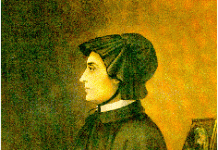If you’d like a view into the speciousness and illogicality of the pro-abortion argument, you could do worse than peruse this Wired piece, on the objections to the ‘fetal heartbeat’ bills which are being legislated in certain states (Alabama being the most recent example, setting up the question of abortion returning to the Supreme Court, and a test of the tragic 1973 Roe v. Wade decision. There are those for life, and those not, who see humans as made in the image of God, with a dignity and a right to life from the moment of conception, and those who do not, for whom a baby – and, we may suppose, any human who does not fit their specific ‘criteria’ – is a ‘clump of cells’ powered by ‘electrical impulses’.
What are we to say of Bishop Celestino Aos Braco of Copiapo, the new apostolic administrator of the Archdiocese of Santiago, who in this video is seen refusing Holy Communion to those who kneel to receive, while offering the Host to those who are standing. The 2004 Instruction, Redemptionis Sacramentum forbids such refusal, stating quite clearly:
Hence any baptized Catholic who is not prevented by law must be admitted to Holy Communion. Therefore, it is not licit to deny Holy Communion to any of Christ’s faithful solely on the grounds, for example, that the person wishes to receive the Eucharist kneeling or standing. (par. 91)
In this Crux interview, you may read his explanation, such as it is, wherein Bishop Braco said he asked them to ‘get up’ and, when some did not, exercising their right and privilege to receiving ‘while kneeling’, the Bishop refused them. Here is his response to the question, What was the criterion for making them stand up to receive communion?, and his reply is significant, offering a window into a certain episcopal mind:
Communion is not simply a union with God but with the community. There is a Spanish saying that says: ‘Where you are going, do whatever you see.’
If I go to a place where everyone receives communion on their knees, I do so too. And if everyone goes to communion standing up, this is normal too. A week later, as I celebrated Mass in the Sanctuary of Mercy, there were some who received communion on their feet, others on their knees, it was given to all.
I believe that Jesus Christ is in the Holy Host, whether I’m standing or kneeling. At that time there was a reaction, some said I humiliated [these people] by asking them to get up. If they felt humiliated, I ask forgiveness, it was not the intent. But despite this incident, I’m calm.
We as Catholics would agree with the Bishop that ‘Jesus Christ is in the Holy Host’ whether we are ‘standing or kneeling’, but that is not the point, is it? Rather, the question is how should we respond to His presence, especially in receiving Him? And what is meant by ‘union with the community’, when certain people are refused the very ‘sacrament of unity’ for kneeling in reverence, the way Catholics have received from time immemorial, preferably with a finely-crafted Communion rail, instead of the supermarket line-up version, now become ubiquitous and enforced?
One may fairly ask whether His Excellence has read the Vatican directive, and whether his calm conscience agrees with what is decreed therein. Does anyone else find it odd, even scandalous, that kneeling Catholics are publicly refused Communion, while politicians who vehemently support the ‘right’ to pre-born murder march up and receive with impunity, at least, ecclesial impunity? And this, even after Pope Benedict’s 2007 directive that those who politicians, and others, who support abortion not receive Communion?
A number of bishops have refused to refuse, claiming it would be such ’embarrassing’ to do so, especially at the altar rail, and would not be effective. I will leave the follow up question rhetorical for now.
To be fair, as Bishop Braco alludes, he did give Communion to standing and kneeling recipients ‘a week later’, even posting a video of himself doing so, which one may suppose is his way of making amends. One is left to wonder what motivated this change of heart, or at least action, but it is a step in the right direction.
One of the main problems in the Ecclesia moderna is the lack of unity, in belief, in practice, and in discipline, which is quite different from a legitimate Catholic diversity within that unity (e.g., in rites, architecture, devotions, customs). We are a fragmented Church, and the spirit of disunity seems to be growing. We, as the faithful, should not have to go to Mass, or any Liturgy, not knowing what to expect, and all too often hit with unpleasant, jarring and even embarrassing surprises.
Ut unum sint, Christ prayed, that ‘they may be one’, as He and the Father are ‘one’. And a significant step towards that unity would be allowing Catholics to live and breathe within the laws and customs of the Church, according to that very ‘spirit of unity’ with which they were intended.
And, while on liturgical unity, a shout out to Dan Millette, a former student and colleague, on his fine, recent eulogy on a fellow alumnus of our College, Father Kenneth Walker, and his all-too brief life and priestly ministry, gunned down in his own rectory while trying to help his pastor, who was being robbed, on June 11, 2014. I’m not sure how many prayers the good young priest needs – we may never presume, so requiescat in pace – but ‘Kenny’ did indeed seem to go to eternity the way he lived, ‘like an arrow’, much like Saint Therese said she also wanted to speed towards heaven, without any encumbrance of deviation. May we all have the same intention, even if our own flight trajectory deviates at times. The example of the saints – canonized and the potential otherwise – can always help us get back on course.











